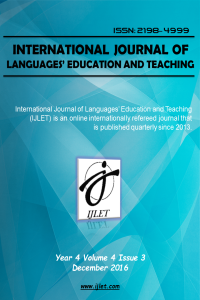A NEED FOR CONCEPTUALLY FLUENT LANGUAGE LEARNERS: RETHINKING THE USE OF TRANSLATION METHOD IN THE TEACHING OF IDIOMS
Öz
Recently the notion of conceptual fluency has attracted much attention owing to its potential to native-like use of foreign language. It has conclusively been shown that comprehending the concepts of the target language, L2 learners may acquire the ability to speak as native speakers. Situated within the framework of developing conceptual fluency of L2 learners, this study examined whether the type of instruction has an effect on the conceptual fluency development of beginner level adult EFL learners. The participants consisting of 38 beginner level preparatory students of School of Foreign Languages of Kahramanmaraş Sütçü İmam University were divided into two groups. The experimental group was exposed to a translation method rested on the comparison of L1 and L2 concepts to learn idioms taken from the songs while the control group learned these idioms through traditional translation method. The data included students’ one minute response paper gathered after each treatment which lasted 3 weeks and a 20 item-multiple-choice post-test. An ANCOVA analysis of the post-test scores showed that the experimental group accomplished better than the control group. The content analysis of the students’ one minute response paper also highlighted that translation method rested on the comparison of L1 and L2 concepts increased the awareness of the participants towards the non-literal meaning of English idioms. It appears that translation method comparing L1 and L2 concepts might contribute to the conceptual fluency development of beginner level adult L2 learners.
Anahtar Kelimeler
Kaynakça
- Utley, R. (2011). Theory and research for academic nurse educators. Sudbury, Canada: Jones and Bartlett Publications. Weber, R. P. (1990). Basic content analysis. London, the UK: Sage Publications. Whong, M. (2011). Language teaching: Linguistic theory in practice. Edinburg, Great Britain: Edinburg University Press. Yasuda, S. (2010). Learning phrasal verbs through conceptual metaphors: A case of Japanese EFL learners. TESOL Quarterly, 44 (2), 250-273.
Öz
Kaynakça
- Utley, R. (2011). Theory and research for academic nurse educators. Sudbury, Canada: Jones and Bartlett Publications. Weber, R. P. (1990). Basic content analysis. London, the UK: Sage Publications. Whong, M. (2011). Language teaching: Linguistic theory in practice. Edinburg, Great Britain: Edinburg University Press. Yasuda, S. (2010). Learning phrasal verbs through conceptual metaphors: A case of Japanese EFL learners. TESOL Quarterly, 44 (2), 250-273.
Ayrıntılar
| Birincil Dil | İngilizce |
|---|---|
| Konular | Dil Çalışmaları (Diğer) |
| Bölüm | Araştırma Makalesi |
| Yazarlar | |
| Yayımlanma Tarihi | 30 Aralık 2016 |
| Yayımlandığı Sayı | Yıl 2016 Cilt: 4 Sayı: 3 |

